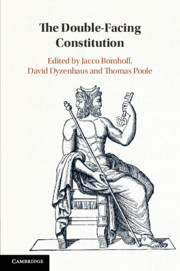Book contents
- The Double-Facing Constitution
- The Double-Facing Constitution
- Copyright page
- Contents
- Contributors
- 1 Introduction
- Part I Theoretical Foundations
- 2 The Janus-Faced Constitution
- 3 The Idea of the Federative
- 4 Hobbes’s Janus-Faced Sovereign
- 5 Jurisprudential Reflections on Cosmopolitan Law
- 6 From Republican Self-Love to Cosmopolitan Amour-Propre: Europe’s New Constitutional Experience
- Part II Border Crossings: Comity and Mobility
- Part III The Foreign in Foreign Relations Law
- Index
3 - The Idea of the Federative
from Part I - Theoretical Foundations
Published online by Cambridge University Press: 17 January 2020
- The Double-Facing Constitution
- The Double-Facing Constitution
- Copyright page
- Contents
- Contributors
- 1 Introduction
- Part I Theoretical Foundations
- 2 The Janus-Faced Constitution
- 3 The Idea of the Federative
- 4 Hobbes’s Janus-Faced Sovereign
- 5 Jurisprudential Reflections on Cosmopolitan Law
- 6 From Republican Self-Love to Cosmopolitan Amour-Propre: Europe’s New Constitutional Experience
- Part II Border Crossings: Comity and Mobility
- Part III The Foreign in Foreign Relations Law
- Index
Summary
Thomas Poole makes the case for an account of the double-facing constitution which puts the idea of the federative at its heart. Locke used that term to designate the foreign relations power of the commonwealth. The argument builds on Locke’s intuition, sourced from Cicero, that this power is concerned centrally with the capacity to effect compacts (alliances) with other political associations. One advantage of the perspective that ensues is that this compact-making power is demonstrably a juridical idea. It is an idea, moreover, that is open to the possibility of reciprocity and, by extension, the development of truly juridical structures of mutual recognition. In contrast to rival theories which have war or enmity as the focus of foreign relations, the federative theory relies on the generative properties of compact making and serves as such to de-centre war from this central position within the external constitution. The federative offers the prospect of escaping the paradox of the sovereign state, based on law and peace internally, but geared to prerogative and war externally, and unites the object of the internal and external aspects of the constitution - peace - and the means of achieving that object – law.
- Type
- Chapter
- Information
- The Double-Facing Constitution , pp. 54 - 93Publisher: Cambridge University PressPrint publication year: 2020



